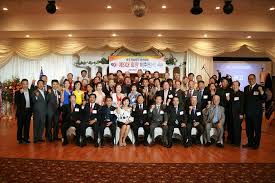CA
ON
한인을 위한 KOREAN JOB BANK
전화: 6476245886
4065 Chesswood Drive Toronto, ON
.jpg)
스마트 디지탈 프린팅 - 인쇄 및 디자인
전화: 416-909-7070
4065 chesswood dr. Toronto, ON
.jfif)
최고의 POS시스템 - 스마트 디지탈 POS
전화: 416-909-7070
4065 CHESSWOOD DR. NORTH YORK Toronto, ON
0.jfif)
준비된 바이어 그룹 , BAYTREE 이너써클
전화: 416-226-5999
7030 Woodbine Ave. Suite 103 Toronto, ON

골프 싱글로 가는길
전화: 647-291-2020
115 York Blvd Richmond Hill Toronto, ON

부동산캐나다 (Korean Real Estate Post)
전화: 416-449-5552
1995 Leslie Street Toronto, ON
.jfif)
싸인건설
전화: 416-909-7070
4065 Chesswood Dr. North York, ON
0.jfif)
토론토 민박 전문집
전화: 416-802-5560
Steeles & Bathurst ( Yonge) Toronto, ON

조준상 (로열르페이지 한인부동산 대표)
전화: 416-449-7600
1993 Leslie St. Toronto, ON

캐나다 공인 컨설턴트 - 한인크레딧 컨설팅
전화: 416-897-8438
1 High Meadow Place, Unit 2 North York, ON

호남향우회 (토론토)
전화: 647-981-0404
7 Bishop Ave. #2411 Toronto, ON

행복부동산 -수잔정 Home Standards Brickstone Real
전화: 647-866-7878
180 Steeles Ave W Unit 30, Thornhill, ON

A Man in Jesus Christ, exploring the Joy of the Peace in Jesus Christ thru Bible, proclaiming His Truth of Blood and Death until He comes.
블로그 ( 오늘 방문자 수: 3 전체: 3,704 )
캐나다의 일부다처제와 매춘 합법화
eliyahu
2010-12-10
배도의 진행과정 –
캐나다의 일부다처제 와 매춘 합법화
최근에 두개의 중요한 판결이 캐나다에서 진행되었습니다. 하나는 온타리오에서 매춘을 사실상 합법화하는 법안이었고 다른 하나는 브리티시 컬럼비아에서 일부다처제를 사실상 용인하는가? 하는 문제였습니다. 온타리오주의 경우는 최종판결을 내년2011년 4월29일까지로 미루는 것으로 결정되었는데 요지는 매춘 금지가 헌법상의 자유를 제한하는 것이라는 위헌 요소를 다루었고, 교통안전과 위생문제 등만 해결하면 합법화되어야 한다는 주장에 대해서 심리하는 내용이었습니다.
비씨 주(밴쿠버 인근)의 경우 일부다처제를 막는 것은 종교의 자유를 막는 위헌이라는 주장으로 이것이 아랍 무슬림들에 의해 주장된 것이 아니라, 소위 기독교라고 자칭하는 몰몬교도들에 의해 주장되었습니다.
밴쿠버 인근에 있는 바운티풀이라는 마을에는 몰몬교도들 800여명이 살고 있는데 두명의 지도자들이 수십명의 아내들을 두고 있으며 그들의 자녀들 또한 수십명씩이고 그외 여러명이 그렇게 생활해온것으로 알려졌습니다. 이런 자들은 자녀들을 낳기만 하였지 다음에 기르는 것에 대해서는 책임지지 않는 것으로 알려졌습니다.
이런데도 종교의 자유라는 이름으로 이것을 은근히 합법화하거나 정당시하려는 움직임이 있는데 그 배후는 물론 이슬람교도들도 크게 한몫하는 것으로 보입니다. 자세한 전말은 제가 그 이전의 심리와 판결내용을 읽어보지 못하여 잘 모르겠으나 분명한 추세는 기존의 기독교적 윤리관은 흔들리고 있다는 점입니다.
몰몬교도들은 여기서 뿐만 아니라 다른 여러곳에서 일부다처제로 많은 문제들을 야기한바 있습니다.
그런데 제가 보는 관점은 바로 이러한 현상이 배도의 과정이라는 것입니다. 저는 배도가 순간적으로나 단기간에 이루어지는 것이 아니라, 서서히 진행되어 확연히 배도된 현상으로 굳어질 것으로 보고 있습니다.
데살로니카 후서 2장
3 누가 너희를 아무런 방법으로도 현혹시키지 않게 하라, 왜냐하면 먼저 배도가 이르고 죄의 사람, 곧 멸망의 아들이 나타나지 아니하면, 있지 아니하리니,
여기서 말하는 배도란 어느 한분야에서만 집중적으로 일어나는 것이 아니라, 기독교계 목사들의 배도, 사회의 전반적 타락, 등이 이루어지는 것으로 전세계는 서서히 그러한 배도의 길을 걸어가고 있는 것으로 보입니다. 그때에는 살인도 조금 과격한 스포츠에 불과하다고 할 것 같습니다.
일부다처제나 매춘도 은연중에 용인될 수 있습니다. 일부다처제는 동성애보다 성경에서 용인되었습니다. 기독교 진리가 특정종교의 주장이라는 비방으로 막혀버리는 상황에서 전 세계의 도덕을 기대한다는 것은 어려운 일일 것입니다.
성경에서 동성애를 비난하는 번역을 하면 제소될 수 있다는 우려가 이미 나온바 있습니다.
일부다처제와 매춘 합법화는 바로 이러한 배도의 현상을 잘 보여주는 예로 보입니다.
인간들의 가치는 여기 저기에서 떨어지고 살기는 어려운 시대로 들어가는 것으로 예상됩니다.
앞으로는 해괴한 일들도 합법화 될 것이며 그런데에 지식인들, 정부 고위관리들, 법원, 의회의 고위직 인사들과 지식인들이 앞장서서 배도를 주도할 것입니다.
이미 동성결혼의 합법화가 여러 나라에서 이루어졌습니다. 교회는 교회대로 여성목사들을 세운데 이어, 동성결혼 목사들도 세웠습니다. 또 포르노 음란 영상들은 거의 합법화되어 있습니다.
이러한 현상들이 배도의 현상이고 앞으로 더욱 도덕이 땅에 떨어지는 방향으로 진행될 것입니다. 그때쯤 죄의 사람, 멸망의 사람인 적그리스도가 등장할 것입니다.
Video: Wife makes video affidavit
VANCOUVER—Women are treated like commodities in polygamous societies and their economic freedoms are reduced.
That’s the opinion of economist Shoshana Grossbard who testified at B.C. Supreme Court Tuesday in a case to determine whether the country’s polygamy laws are constitutional.
Grossbard, who has studied the economic effects of polygamy in other countries, testified that there will be increased disparity between husbands and wives if Canada were to legalize polygamy.
“In the cultures and societies worldwide that have embraced it, polygamy is associated with undesirable economic, societal, physical and emotional factors related to women’s well-being,” Grossbard said Tuesday.
The natural economic consequence of polygamy should be increased market value for women, since multiple wives are highly desirable. But in these societies, husbands can simply divorce the wives they don’t want, so women don’t actually have control over their value.
Grossbard was a witness for the Christian Legal Fellowship, an organization that has legal standing in the reference case that has involved nearly a dozen intervenors and organizations. The attorneys general for B.C. and Canada are in court arguing that the 50-year-old polygamy law in the country is constitutionally valid, a finding it is seeking from the court in order to pursue possible litigation against the polygamous community in Bountiful, B.C.
There are nearly 800 believers of the Fundamentalist Church of Jesus Christ of Latter Day Saints (FLDS) living in the interior of B.C. in two separate factions under two feuding leaders, Winston Blackmore and James Oler. Among them, the two men have dozens of wives and dozens of children.
Grossbard testified that there is an increase in the number of polygamous marriages in western countries because of immigrants who are Muslim or from African countries and is practiced in many cultures and on most continents. She traced polygamy to other women and children issues including female circumcision, which makes it easier for men to control wives when they’re less able to experience sexual pleasure.
In polygamous relationships, women are more likely to be widowed because their husbands are considerably older, and children are more likely to have health problems and have less access to education, she said, Polygamist men tend to spend their money on having more children rather than investing in their existing children’s education, Grossbard testified.
Groups on the opposing side of provincial and federal governments include the FLDS, free speech organizations and a court-appointed amicus who is being funded by the provincial government to take the opposing view that the current law is a violation of religious freedom.
Under cross-examination by Tim Dixon, acting as an amicus, or friend of the court, Grossbard admitted that there is no proof that legalizing polygamy will increase the number of polygamists in Canada. She also testified that there is a potential for women to be harmed financially if the breadwinner in polygamous marriages, the husband, is jailed if Canada’s polygamy laws are enacted.
Beside Bountiful, there are known pockets of polygamists living in Quebec and Ontario but how many there are remains unclear because the communities are isolated.
Also in court Tuesday, the B.C. Supreme Court judge hearing the case ruled that the media is allowed to broadcast video affidavits taken from witnesses who have left polygamous communities.
One of those witnesses, Ruth Lane, the tenth wife of Blackmore, had sought to have the evidence barred from the Internet. In her testimony Lane, dressed in a pink tank top, her hair pulled back in a ponytail, is interviewed in her home in Hurricane, Utah. She had married Blackmore after he came to talk to the FLDS community in Colorado City, Arizona in 1994, one of three women the self-proclaimed bishop married in the span of two weeks.
One week before her marriage to Blackmore he had married two sisters from her community.
“He had a thing for sisters,” Lane said, smiling nostalgically. A year after marrying her, Blackmore married Lane’s sister.
The man Lane called “Wink” was “very charismatic” and younger than many of the church leaders. He was 40 when they married, 17 years older than her. She already had one child from an earlier relationship before eventually having six more kids. She left Bountiful to move back to the U.S. when Blackmore refused to “work on their relationship,” Lane said.
The case continues until January.
http://www.thestar.com/news/canada/article/903130--economic-freedom-reduced-for-women-in-polygamous-marriages-says-expert
일부다처제의 몰몬교도 부인이었다가 탈출한 여자의 증언 비디오
http://www.thestar.com/videozone/903128--wife-makes-video-affidavit
다른 일부다처제 몰몬교도의 부인 기사
James Keller The Canadian Press
Meet Canadian Singles
View photos & browse profiles.
See who's online near you now!
www.match.ca
VANCOUVER—Rena Mackert sat in tears in the front row of a Vancouver courtroom Wednesday, as she watched a video of herself recounting a childhood marked by sexual and physical abuse, which she said is the direct result of the polygamous life she was born into.
Mackert was the first of 14 women and children who once lived in polygamous communities to offer videotaped testimony at a British Columbia court case examining Canada’s polygamy law.
Mackert was born in 1953 in an area that later became known as Colorado City, Ariz. Her mother was a third wife; her father later married a fourth, and the family eventually grew to include 31 children.
Sitting in her home in Anacortes, Wash., nervously fidgeting with a green pendant hanging around her neck, the 56-year-old told a B.C. government lawyer sitting behind the camera about being sexually abused at the age of three.
“My father molested me for the first time that I know of,” Mackert said in a calm voice, her eyes often closed or looking away from the camera.
“It was forced oral sex. I cried and begged and pleaded. He slapped me and pulled my hair. He slapped me and spanked me and told me what a bad girl I was, that if I told anyone what a bad girl I was, he would have to spank me very severely.”
The abuse continued for more than a decade, said Mackert, and all the while she was convinced it was her fault after years of being “indoctrinated” that women must submit to men.
“So from the onset of the sexual abuse from my father, it was very clear to me that I was a bad, evil person and I’d done something to cause my priestly father to do those things,” she said in the video, one of four broadcast in court on Wednesday. The rest will be presented as the hearings continue over the next two months.
“We were taught that a woman’s responsible for a man’s behaviour, sexually. If you dress in a way, tight clothing, clothing that shows your skin, and a man thinks evil thoughts, it’s the woman’s fault.”
Mackert was born into the Fundamentalist Church of Jesus Christ of Latter Day Saints, or FLDS. The FLDS is a breakaway sect of the mainstream Mormon church, which renounced polygamy more than a century ago, and it is the sect linked to the isolated community of Bountiful, B.C.
It was the failed prosecution of two religious leaders of Bountiful that prompted the B.C. government to ask the court to examine whether Canada’s ban on multiple marriage is in accordance with guarantee of religious freedom in the Charter of Rights.
Outside court, Mackert said her experience wasn’t unusual among the polygamous families she knew, where women and children had no rights.
“This is not about religious freedom. This is about abuse — there was sexual abuse in just about every home,” she told reporters.
Mackert’s family moved to the Salt Lake City area when she was around seven years old, but she said the abuse continued until she was about 16 — a year before she was married.
Mackert was forced to marry her step-brother, with whom she had three children. Five years later, they divorced when Mackert’s husband declared he wanted out of the polygamous lifestyle.
She said she was told by the man leading the church at the time, Leroy Johnson, that she would be forced to marry a man in his 50s who was already married to her sister. She refused, and also took it as an opportunity to tell Johnson about the abuse she has suffered.
“He demanded to know why I was lying about one of God’s priesthood holders, he told me that I was a liar,” she said in the video.
A few days later, she was ordered to leave without her children. She moved to California, where she met a lawyer who helped her return 11 months later and take her kids.
It took her years to overcome the psychological scars of her childhood, Mackert said, and she hasn’t completely healed. She struggled with drug and alcohol abuse into her 40s, and said she still suffers from depression and post-traumatic stress disorder.
Participating in the B.C. case, she said, has helped.
“I got no justice for my father and the mistreatment, and though I am not getting justice here, my voice is heard, and it needed to be,” she told reporters after watching her video affidavit in court.
“I feel like I’ve been validated, the things I went through.”
http://www.thestar.com/news/canada/article/903742--the-face-of-polygamy-woman-recounts-abusive-childhood-for-b-c-court
The Canadian Press
Free 2011 Horoscope Now
The Best Free Horoscope For 2011
100% Accurate: Love, Money, Luck
Gabriella-Psychic.com/Horoscope2011
VANCOUVER—An expert witness says increased demand for wives in polygamous societies leads to cultural institutions that control women and harm their financial, social and physical well-being.
Shoshana Grossbard, an expert in the economics of marriage from San Diego State University, has told a B.C. court examining Canada’s law against polygamy that the practice leads to a reduced supply of wives, increasing demand.
But rather than making women more valuable in such communities, Grossbard says that scarcity requires men in polygamous societies to exert control over women to ensure they have wives.
Grossbard, whose research has focused on polygamous cultures in Africa, says that leads to arranged marriages, teenage brides, forced isolation and dowries.
She says it also fosters jealousy among plural wives and causes psychological and health problems, as well as limiting their access to education.
Grossbard says if Canada were to legalize polygamy, those problems could become more common in this country.
http://www.thestar.com/news/canada/article/902958--polygamy-means-arranged-marriage-teen-brides-b-c-court-hears
온타리오 매춘 합법화
Jayme Poisson Staff Reporter
Dating at Match.com™
Media Canadian Singles.
View Photos & Profiles.Try it now!
www.match.ca
Laws criminalizing prostitution in Ontario will remain in place. At least until April 29, 2011.
Justice Marc Rosenberg released his ruling this morning, saying he will extend the stay on a landmark decision made by a Toronto judge this fall that would have allowed sex workers to hire bodyguards and communicate freely to sell services.
Rosenberg granted the “brief stay,” giving the government time to make their appeals.
Lawyer Alan Young, who represents dominatrix Terri Jean Bedford, said the judge was concerned with the lack of laws to regulate the industry.
“It's business as usual for the government, which basically means a bad law will continue to be enforced,” he added.
These regulations would have to come from Parliament, the legislatures, municipal governments and social agencies.
Last week, lawyers from Ottawa and Queen’s Park pleaded with the Ontario Court of Appeal to extend the stay.
At the end of September, Ontario Superior Court Justice Susan Himel struck down three of Ontario’s prostitution laws, saying provisions meant to protect women are violating their rights and “contributing to the danger faced by prostitutes.”
Technically, prostitution is legal in Canada, but much of what would allow a woman to practice her trade – living off the avails of prostitution, running a bawdy house and communicating to sell sex services – is illegal.
Her ruling will likely wind its way up to the Supreme Court.
In court last week, Young argued that continuing the stay would be turning a blind eye to violence against sex workers.
The provincial and federal governments, who teamed up to oppose Himel’s 131-page ruling, argued a “legislative void” could lead to a litany of scenarios.
Federal government lawyer Michael Morris said that if no stay was granted, Canada would be plunged into a “social experiment unprecedented in this country.”
“It will profoundly and irreversibly alter the status quo,” he said.
In the absence of any legislation to regulate the industry, Morris argued prostitution would increase in Ontario. Brothels could spring up and “strip clubs would expand their menus.”
In his ruling, Rosenberg called some of the government’s arguments “less than compelling.”
Right now, police are still enforcing the laws. But what about cases before the courts?
In a statement, Justice Minister Rob Nicholson said the challenged Criminal Code provisions will remain in effect until the stay is up or an appeal is heard.
“It is the position of the Government of Canada that these provisions are constitutionally sound,” said Nicholson, adding that the provisions “denounce and deter the most harmful and public aspects of prostitution.”
“Here’s what’s sort of strange,” said Young. “The law is still enforced but I don’t believe any of these cases, dealing with the laws that have been struck down, will proceed (in the courts).”
“In theory, you could have a trial and be convicted. But what if those laws are then found to be constitutionally invalid?” he added.
Avoiding this limbo is one of the reasons why Young has called for the appeal process to be expedited. As a lawyer, he said, he would argue that any case dealing with the three laws currently before the courts should be adjourned until appeals have been heard.
Outside the court Thursday Bedford addressed Prime Minister Stephen Harper.
“The prime minister is hiding behind the courts. He should come out and fight like a man. His silence means that he is not concerned about the violence against women.”
On a tour of an infrastructure project in Mississauga earlier today, Prime Minister Harper responded to Bedford’s remarks.
“I have never been called upon to respond to a dominatrix before.”
“Just so we’re absolutely clear on this. I don’t know who this individual is,” the Prime Minister said of Bedford. “I am sure I have never met her.”
Harper called the sex trade “bad for society.”
“That’s a strong view held by our government and I think by most Canadians.”
With files from Linda Diebel
http://www.thestar.com/news/article/900348--stay-extended-prostitution-laws-remain-in-effect
Dominatrix Terri-Jean Bedford and law professor Alan Young talk on the steps of Osgoode Hall on Thursday after Justice Marc Rosenberg of the Ontario Court of Appeal granted a stay on three prostitution-related laws until April 29.
STEVE RUSSELL/TORONTO